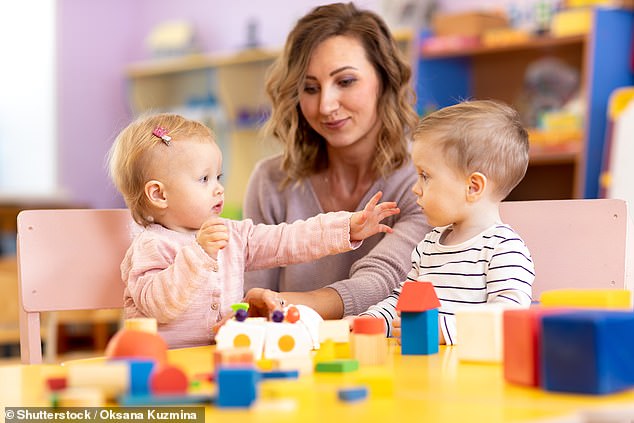Why are people talking about this?
The debate has been sparked by an article in the Economist magazine – whose editor Zanny Minton Beddoes is a mother of four – about policies that encourage women to have children.
Korea can even offer £57,800 for each new baby. It is a response to the falling birth rate in developed economies, which has many consequences.
Is it time to have babies? Some argue that the choice to have fewer babies is a threat to civilization
Growth is likely to stagnate and there will not be enough young workers to support aging baby boomers.
There may also not be enough people of fighting age to ensure national security. No wonder President Macron of France is developing a ‘réarmement démographique’ (demographic rearmament) strategy.
Some argue that the choice to have fewer babies is a threat to civilization, a view called “pronatalism” in the United States.
Among his followers is billionaire Tesla boss Elon Musk, who has 11 children.
Her views are shared by many right-wing Silicon Valley executives and by Donald Trump, a father of five, who would encourage motherhood if elected president.
Is there really a problem?
‘Superwomen’ like Helena Morrissey, who combined a career at City with nine children, are the exception.

Opinions: Elon Musk’s views on the number of babies are shared by many right-wing Silicon Valley executives and by Donald Trump, father of five.
Women in the 40-something demographic in the UK have an average of 1.94 children.
The replacement level, at which a population remains stable without immigrants, is 2.1. The average in the United States and other high-income countries is 1.6.
Germany has a fertility rate of 1.58 and Japan’s is 1.2, while South Korea has an even more worrying rate of 0.72. There is a looming shortage of K-Pop stars and buyers of their albums.
Japanese Prime Minister Fumio Kishida describes the baby shortage as the country’s “most serious crisis.” The nation will spend £17.9bn on allowances to encourage more offspring.
Is it a problem worldwide?
The fertility rate in Nigeria is one of the highest in the world at 5.09, although it has decreased slightly. In India it is 2.03. China abandoned its one-child policy in 2016, but its rate remains 1.1.
What is the UK doing about the baby problem?
According to many critics, it is not enough.
The child benefit cap restricts payments to two children in a household. Neither the Conservatives nor Labor are seeking to repeal this rule as part of their general election proposals.
But the individual income limit to qualify for child benefit was raised to £60,000 in April this year in response to pressure.
The Government believes it can encourage parents to work by offering more help with childcare to those earning less than £100,000 a year.
The State pays for 30 hours of childcare per week for three- and four-year-old children. Two-year-olds receive 15 hours and the program will be expanded to babies nine months and older. Labor supports this expansion.
But the system is complex and only covers 38 weeks a year.
Child care providers are struggling with rising salaries and other overhead expenses, and some are going out of business, meaning child care services may not be available.
The typical bill for 50 hours a week of childcare for a child under two is £302.10 a week or £15,709 a year. In London, the annual average is £22,269.
Should we pay women to have children?
The problem is that this does not seem to work, as The Economist article concludes.
Korea has been trying for 20 years, offering subsidized housing, free hospitalization and IVF bills, with monthly payments of just over £400 for a child under one year old.
The generous packages in Denmark, Finland and Sweden also seem ineffective; their birth rates are 1.5, 1.42 and 1.67 respectively.
Under Germany’s Elterngeld (parental money) subsidy package, a parent who stops working during their child’s first 12 months receives 65 per cent of their net monthly income up to a maximum of just over £1,500, but that hasn’t worked either.
So what is the solution?
The Economist proposes more technology to reduce the burden of housework and allow people to work longer.
Politicians may be admiring bouncy babies this election, but they are short of ideas to persuade British women to have more.
Some links in this article may be affiliate links. If you click on them, we may earn a small commission. That helps us fund This Is Money and keep it free to use. We do not write articles to promote products. We do not allow any commercial relationship to affect our editorial independence.



